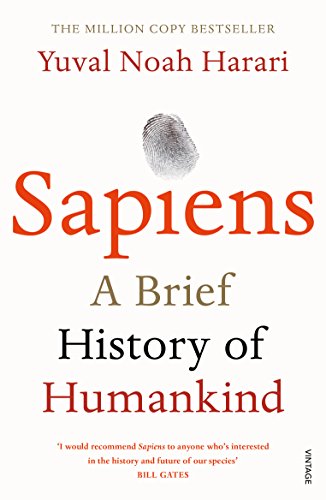
Sapiens: A Brief History of Humankind

Culture tends to argue that it forbids only that which is unnatural. But from a biological perspective, nothing is unnatural. Whatever is possible is by definition also natural. A truly unnatural behaviour, one that goes against the laws of nature, simply cannot exist, so it would need no prohibition. No culture has ever bothered to forbid men to p
... See moreYuval Noah Harari • Sapiens: A Brief History of Humankind
The immense diversity of imagined realities that Sapiens invented, and the resulting diversity of behaviour patterns, are the main components of what we call ‘cultures’. Once cultures appeared, they never ceased to change and develop, and these unstoppable alterations are what we call ‘history’.
Yuval Noah Harari • Sapiens: A Brief History of Humankind
Back then, each British city and town had its own local time, which could differ from London time by up to half an hour. When it was 12:00 in London, it was perhaps 12:20 in Liverpool and 11:50 in Canterbury.
Yuval Noah Harari • Sapiens: A Brief History of Humankind
Ever since the Cognitive Revolution, Sapiens have thus been living in a dual reality. On the one hand, the objective reality of rivers, trees and lions; and on the other hand, the imagined reality of gods, nations and corporations. As time went by, the imagined reality became ever more powerful, so that today the very survival of rivers, trees and
... See moreYuval Noah Harari • Sapiens: A Brief History of Humankind
Telling effective stories is not easy. The difficulty lies not in telling the story, but in convincing everyone else to believe it. Much of history revolves around this question: how does one convince millions of people to believe particular stories about gods, or nations, or limited liability companies? Yet when it succeeds, it gives Sapiens immen
... See moreYuval Noah Harari • Sapiens: A Brief History of Humankind
In modern times, a small difference in skin colour, dialect or religion has been enough to prompt one group of Sapiens to set about exterminating another group.
Yuval Noah Harari • Sapiens: A Brief History of Humankind
The Agricultural Revolution certainly enlarged the sum total of food at the disposal of humankind, but the extra food did not translate into a better diet or more leisure. Rather, it translated into population explosions and pampered elites. The average farmer worked harder than the average forager, and got a worse diet in return. The Agricultural
... See moreYuval Noah Harari • Sapiens: A Brief History of Humankind
If not, what was the point of developing agriculture, cities, writing, coinage, empires, science and industry? Historians seldom ask such
Yuval Noah Harari • Sapiens: A Brief History of Humankind
Such myths give Sapiens the unprecedented ability to cooperate flexibly in large numbers.